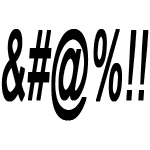 In the classic film “A Christmas Story”, little Ralphie accidently sends the lug nuts flying while helping his father change a flat tire, he cries out an exasperated “FUUUUUDGE!!” Except, as the voiceover narration informs us, “I didn’t say fudge. I said THE word, the big one, the queen-mother of dirty words, the F-dash-dash-dash word!”
In the classic film “A Christmas Story”, little Ralphie accidently sends the lug nuts flying while helping his father change a flat tire, he cries out an exasperated “FUUUUUDGE!!” Except, as the voiceover narration informs us, “I didn’t say fudge. I said THE word, the big one, the queen-mother of dirty words, the F-dash-dash-dash word!”
An article on curse words by Jo Eberhardt reminded me of the angst I put myself through when I dropped the F-bomb in the opening chapter of my novel “Beneath the Sky”. It’s not that I’ve never said the word. In my twenties, it was my favorite expletive… and noun… and verb, adjective, adverb, conjunction, and on occasion preposition. Or was that proprosition? Whatever – I just mean to say that I’m familiar with its usage.
 But after a similar incident to Ralphie’s as a child – and one bar of Lava-brand soap later – I found myself freezing up over the word. I mean, really… what would my mother think if she ever saw this? It’s not like she’s never heard the word – note the incident with the Lava soap – and I’m sure she’s run into in any number of books she’s read. And it’s not like I used it gratuitously. I put it in early to draw a distinction between the worldly captain of the merchant ship and the overtly devout passengers of God’s Chariot. But still. “Did you have to use that word?”
But after a similar incident to Ralphie’s as a child – and one bar of Lava-brand soap later – I found myself freezing up over the word. I mean, really… what would my mother think if she ever saw this? It’s not like she’s never heard the word – note the incident with the Lava soap – and I’m sure she’s run into in any number of books she’s read. And it’s not like I used it gratuitously. I put it in early to draw a distinction between the worldly captain of the merchant ship and the overtly devout passengers of God’s Chariot. But still. “Did you have to use that word?”
I got over it, of course, and plowed ahead with the f-ing f-word for f-‘s sake. But my anxiety over it got me to thinking about when we curse, when we don’t, and why.
I used to curse up a storm, but I don’t so much anymore. You see, I have kids now, and I find I censor myself around them. I also censor myself in front of my extended family, business contacts, school teachers, employers, police officers, and judges in their Texas courtrooms. “My apologies, your honor, but when I called you a cockwaffle, what I really meant was…” I’m sure you do the same.
But get me in front of some of my rowdier friends, and we’re stretching the limits of polite discussion like a distended, gaping… um, blog entry. Yeah. But we’d never say those things in front of family, teachers, etc. Least of all, our mothers.
But what about fictional characters? How much do they curse, and who do they censor themselves in front of?
Consider that coarse forklift operator at the loading docks. He can make a bartender faint with his language, but he doesn’t dare say those things in front of his mother, or his childhood priest, or that sweet lady who runs the coffee shop near his apartment.
Or maybe that upper crust socialite? She would never use the f-bomb with her husband or bridge partners, but she gets shockingly explicit with her hairdresser.
It would be easy to say it’s all about respect, that you censor yourself around people you respect and curse at those you don’t, but it’s not at all that simple. Soldiers curse with each other all the time amongst equal or lower ranks, but they would be quick to tell you how much they respect each other. The same is true for any tight group coworkers. Yet they don’t curse at their bosses or officers.
There’s definitely an element of intimacy to it, but it’s not sexual intimacy – more like cultural intimacy. We often curse when surrounded by other people who are… I suppose, in our club. It doesn’t have to have a building and a membership list. It merely has to be recognizably separate from the outside world. We’re in the locker room, the cigar lounge, the fishing boat, or the salon. As long as “it’s just us”, we are willing to share that side of us.
But that’s still not all of it. Specific people in my life, who might curse up a storm of their own somewhere else, are still off-limits. If they showed up as a full-fledged member of whatever cursing club I was in, I suspect we would both clam up. Surely, you’ve run into this yourself and that awkward pause as you suddenly shift gears on your vernacular.
So anyway, I don’t have a hard and fast rule for knowing who I’m comfortable cursing in front of vs. who forces me back to darn and fiddlesticks, but I always seem to know it instantly without any conscious analysis. Somehow, this speaks volumes about each of those particular relationships, but I don’t know precisely what it says.
So, who do you curse in front of? Who do you censor yourself in front of? And when you see a fictional character shift language, what does it tell you about him?
